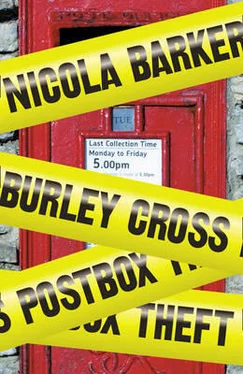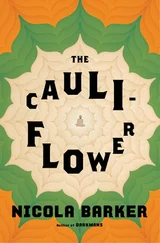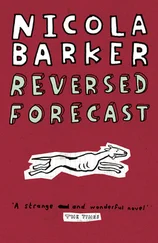‘Who sold you this?’ she demands. I stutter the name of the farm.
‘He obviously saw you coming a mile off!’ she snaps. And then (just in case I was in any remaining doubt), ‘He keeps his livestock in the most appalling conditions. He’s worse than a criminal. You were a fool to go there, an absolute fool!’
‘Oh my goodness!’ Tilly repeats. ‘Is there something wrong with it?’ I ask (peering over at the inoffensive little ball of fluff myself).
‘No. I mean yes. I mean it’s actually… well… a duck,’ Tilly informs me, wincing, apologetically.
‘A duck?’ I echo, mystified. ‘Quack quack,’ Rhona smirks. ‘You’ll need to take it back, I’m afraid.’
She begins to close the lid on the box.
‘But she can’t!’ Tilly squeaks, pulling the box towards her and opening it up again, ‘She can’t take it back! Look how bedraggled the poor thing is! He’s half-starved!’
‘A duck?’ I repeat, horrified. ‘Are you sure?’ (I mean how was I meant to know? I’m a designer , not a vet!)
‘It’s a Muscovy,’ Rhona hisses. ‘A Lavender Muscovy. The ugliest and most pugnacious of all the ducks…’ ‘This puts me in mind of “The Ugly Duckling”,’ Tilly interjects, trying to make light of it. ‘The children’s story,’ she elucidates (having garnered no immediate response).
‘Although, if I remember correctly,’ Rhona interrupts her, ‘that ugly duckling turned out to be a swan, whereas this “hen” is an ugly duckling. It’s a very ugly duckling. And when it grows up, it will be a very ugly duck.’
Of course by this stage Tilly has the little scrap out of the box and is holding him in her hand and staring, devotedly, into his ducky face. She is in love.
‘We could get Edo to build him his own, special duck-house,’ she says, then, before Rhona can object, ‘and we could sink that old bath — the one in the front garden I always plant up with hyacinths…’
(I have shown you a photo of ‘that old bath’, Ivo, in full bloom. I actually took it when I was first up here, house hunting. Remember? You said it was the most beautiful thing you’d ever seen — four brass calf’s hooves supporting a crazily elongated chamber pot. China. Not enamel. Never seen another one like it… Well, they’ve sunk it in the ground now and turned it into a pond. Please, please stop crying. I’ve shed enough tears over it myself, already.)
It’s at this point (I’ve been staring around the kitchen, my design-dar starting to sound loudly in my ear. I mean they have a treasure -trove of stuff in that room…) that my eye alights on a series of exquisite, antique medicine bottles on the dresser, each one delicately hand-painted with scenes from Greek mythology.
‘What are these?’ I say, nudging one, awed.
‘Urgh . Tilly does those,’ Rhona grunts.
‘It’s just a silly hobby,’ Tilly interjects. ‘I find them in the garden and then I…’
‘Could I buy one off you by any chance?’ I demand (heart a-pitter pat).
‘Absolutely not. Don’t be ridiculous! She couldn’t possibly sell them,’ Rhona exclaims, shocked. ‘They’re just therapy for her epilepsy. They’re not worth tuppence!’ ‘No. No . I couldn’t possibly,’ Tilly echoes, mortified, her cheeks pinkening.
‘Tilly’s always been the most terrible pest with a paintbrush,’ Rhona expands, taking the duck from Tilly’s hands now, and staring into its duck-face, herself. ‘If something stays still for long enough then she’s bound to start dabbing away at it — literally anything she can get her hands on — the curtains, the crockery, the table, the walls…’
The wallpaper , Ivo! A perfect bunch of wilting bluebells tied together with a piece of string! Hand-printed and painted (I ripped off a piece from behind the door last week after ‘spilling’ my cup of tea on the floor so that Tilly would rush off to fetch a mop. Enclosed).
‘You painted everything in here by hand?’ I all but gurgle. ‘I’ve run out of space, so I’m concentrating on glass now,’ she sighs, ‘old marmalade jars, jam jars, little broken fragments which I unearth in the garden that I fancy the look of… Sometimes Rhona even lets me buy the odd piece from Oxfam or Save the Children if there’s a special occasion coming up.’
‘Her birthday or something,’ Rhona generously concedes. I don’t actually respond to this. I’m just devouring the room with my eyes. I’m just drinking it all in, almost nauseated, like a bee overdosing on nectar.
Oh, Ivo, Ivo! All that unbridled creativity! It’s stupefying! It’s sickening! It’s deranged! She just exudes it, quite unconsciously. She perspires it. She exhales it. But not a shred of ambition! Not so much as an ounce of it! She just has this… this astonishing eye , this instinct. They both do! And it’s not just the stuff she creates herself — the stuff she makes — but the stuff she owns , the stuff she acquires . It’s whatever she thinks! It’s whatever she touches! It’s in each teaspoon, each tea-cloth, each pepper-pot, each ladle…
It’s a gift! It’s a knack! It’s like every object, every artefact is just another small part of this infinitely complex and coherent Threadbare Cottage Design Universe — a wonderfully evocative stage setting for the gentle Theatre of Threadbare; a further sweet detail in ‘The Threadbare Diorama’.
Yet every time I try and talk to her about it — talk business with her — she just closes down. She refuses to engage. She either goes completely blank, starts blushing, makes her excuses and flees the room, or abruptly changes the subject (‘It’s almost time to start chitting the potatoes!’, ‘I’m so looking forward to spring this year!’, ‘We really should replace that gate. Can you hear it creaking? Isn’t it maddening?’, ‘The parrot has learned a new word! Barnabas! Barnabas! Say “soup”!’).
I’m at my wits’ end, Ivo! She’s driving me insane! I mean what am I to do? Where am I to turn? How can I possibly hope to help someone who refuses to help herself? More to the point, how long can I be expected to just stand quietly by and let all this astonishing talent go to waste? It would be wrong to do so, surely? Obscene! Little short of criminal!
I walked into her kitchen the other week, and there she was (this quaintly eccentric English dear, this unquenchable font of British Design Talent) sitting at one end of the kitchen table, totally engrossed in decorating a broken ashtray she’s found (using this old brush with one — one — bristle stuck on the end of it), and at the other end sits Burley Cross’s token African inhabitant (Eddy — Eddo — Edo — Edouard — I’m not 100 per cent sure, but he’s Congolese — at least I think he is — he speaks with quite a pronounced French accent).
You rarely see him around town (he has his own, quiet alcove at the pub where he likes to sit and get quietly inebriated). He’s in his fifties, but very well-preserved. Handsome. Beautifully dressed. Has quite an attitude — bordering on the arrogant. How he and the Threadbare sisters built up an acquaintance is a mystery in itself (they’re like chalk and cheese! And from what I can tell he — like them — keeps himself pretty much to himself).
I’m told he’s married to a Belgian heiress — she’s much older than he is and spends most of her time in Bruges. Although I think her oldest daughter — by a former marriage — has visited him recently, once or twice.
So he lives alone, for the most part, in what’s reputedly the oldest house in town. It’s called The Bleachers (after a northern bleach magnate who lived there in the early 1800s) and is absolutely gorgeous. I’ve never been inside the place, but it’s lower storey falls under the level of the road — you walk down some little steps to get in through the front door, which is tiny, only four or five feet high.
Читать дальше
Конец ознакомительного отрывка
Купить книгу












